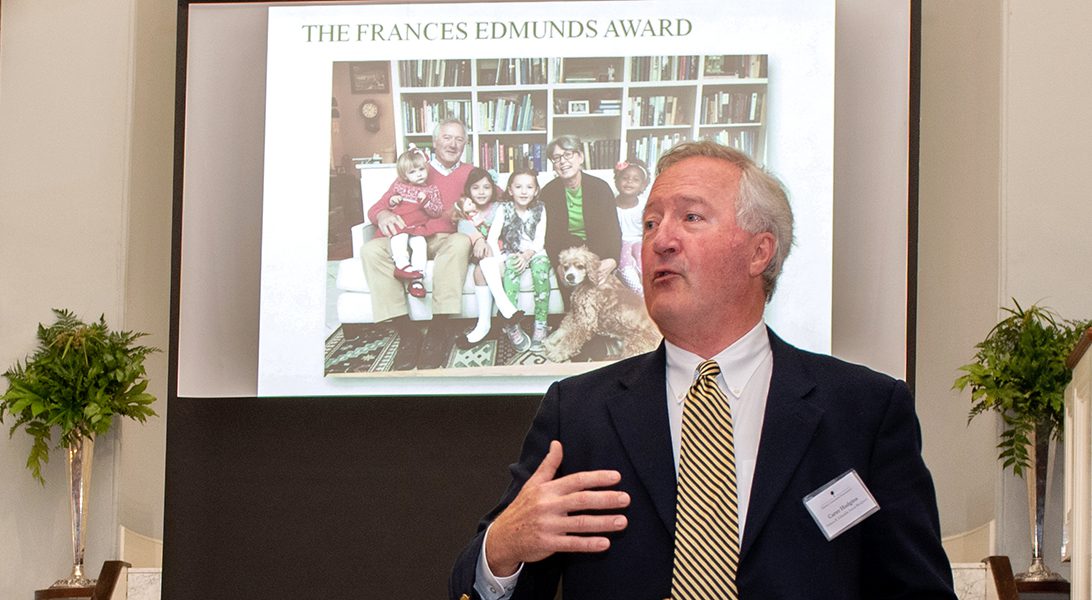
Carter L. Hudgins has received two major awards in South Carolina for his lifelong devotion to the field of historic preservation.
In August, Hudgins retired as the director of the joint Clemson University and College of Charleston Graduate Program in Historic Preservation, a post he held since 2011.
Hudgins was presented the 2019 Governors Award at the South Carolina Statehouse in June. The honor was bestowed by the nonprofit organization Preservation South Carolina in conjunction with the Office of the Governor and the South Carolina Department of Archives and History.
He was recognized for his far-reaching work in “bettering the preservation landscape” in the state and his importance as an educator who has developed future leaders in the field.
Hudgins was selected by a panel that included representatives from Preservation South Carolina, the Office of the Governor; the National Trust for Historic Preservation; the South Carolina African American Heritage Commission; the state’s department of Parks, Recreation and Tourism; the department of Archives and History and other preservation groups.
The 2019 Historic Preservation Awards also celebrated an adaptive re-use project on the main campus of Clemson University, The Barnes Center. The former sheep barn built in 1904 was being used for storage before it was transformed into a vibrant student activity center that still retains its rustic charm.
Historic Charleston Foundation award
In April, Hudgins received the highest honor given by the Historic Charleston Foundation, the Frances R. Edmunds Award. The award is named for the former director of the foundation who earned national acclaim for her preservation and revitalization efforts in the city over several decades.
Hudgins, who was recognized for his lifetime achievements, served as the executive director of the Historic Charleston Foundation from 1993-2000.

“I consider myself extremely fortunate to have had the opportunity to live and work in Charleston where organizations like Historic Charleston Foundation developed many of the methods essential to the success of the modern historic preservation movement,” Hudgins said.
“My years in Charleston, first as a practitioner and more recently as a teacher, offered the opportunity to work with the nation’s most accomplished historic preservation experts, to work on buildings and landscapes that presented the most interesting challenges I could have hoped for, and to help prepare a rising generation of experts who are already taking their place as leaders in our field,” he said.
Hudgins is “enormously proud” of alumni from the Master of Science in Historic Preservation program and their efforts to improve the communities where they work. Within Charleston alone they have left a rich legacy, with their student research yielding nearly 200 house histories now in the files of the Historic Charleston Foundation.
Hudgins also takes great pride in the many buildings restored, stabilized, rehabilitated or saved through the technical research findings by the Historic Preservation students.
“It’s the entire corpus of our work rather than any one building – although our students have worked on many spectacular and interesting ones – that stands out for me,” he said.
While the work of Historic Preservation students almost always has an immediate impact, Hudgins also stressed that much of it will continue to inform historic preservation decisions in Charleston for decades to come.
“We are proud of and grateful for Dr. Hudgins’ tenure at the helm of the Historic Preservation program,” said Kate Schwennsen, director of the School of Architecture at Clemson University. “He is a powerful advocate for the future of historic preservation and those students who will advance its practices. Under his leadership, graduate students were exposed to the breadth and depth of the field, worked with local leaders in preservation and made major contributions to real projects in Charleston, one of America’s most treasured historic cities. Future students will continue to benefit from his vision – and the new fellowships created while he was director.”
Next chapters
Hudgins and his wife, Donna, plan to stay in Charleston, where their two sons and four of five grandchildren live.
For Hudgins, “retirement” is a relative term.
He plans to teach one course during the fall semester. Hudgins is president of the Charleston World Heritage Committee, an organization which is seeking a designation for the city as a World Heritage Site. He also serves on the boards of Preservation South Carolina and the First Colony Foundation, which is based in North Carolina and Virginia. For more than 20 years, the First Colony Foundation has protected key sites and conducted archaeological research that has yielded artifacts from the 16th century, believed to be related to Sir Walter Raleigh’s “Lost Colony” of Roanoke. Hudgins also is completing study of Molana Abbey in County Cork, Ireland.
“There are other ‘piles of shame,’” he joked, referring to several personal projects he has begun, including an unfinished manuscript.
Before he led the Historic Preservation program in Charleston, Hudgins spent several extended stints at the University of Mary Washington in Fredericksburg, Virginia, as the Hofer Distinguished Professor of Early American Culture and Historic Preservation, a chair of the department of History and American Studies and director of its Center for Historic Preservation.
Earlier in his career, Hudgins served on the history faculty at the University of Alabama at Birmingham and Armstrong State University in Savannah, Georgia (now part of Georgia Southern). He also worked as an archaeologist for the Virginia Department of Historic Resources.
Get in touch and we will connect you with the author or another expert.
Or email us at news@clemson.edu

